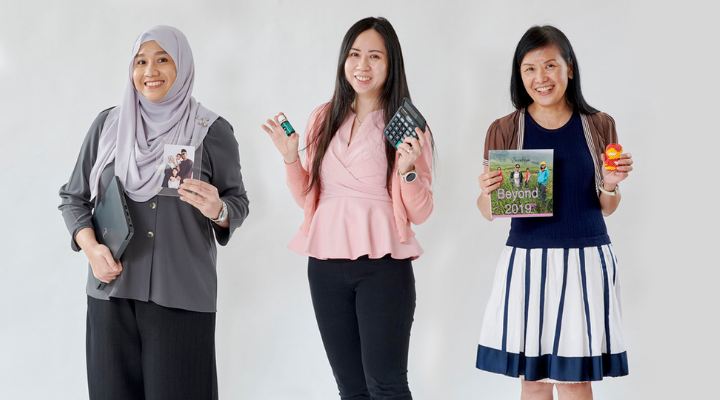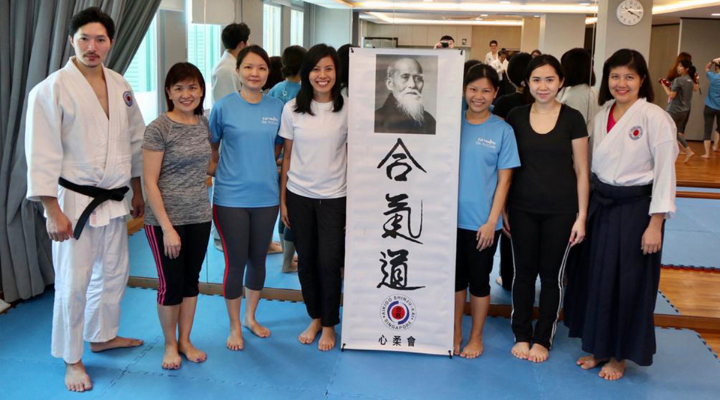Trust Begets Trust: Taking Care of a Work Team’s Mental Wellness
At the Ministry of Communications and Information, Ms Ratna Sari’s philosophy of taking her team’s life outside of work to heart is helping them to better weather the well-being crisis.

With a team of mostly young mothers, Ms Ratna Sari knew that some of her staff might face issues managing their work with children underfoot during the circuit breaker period in 2020 when they all started working from home.
Heading the Finance team at the Ministry of Communications and Information (MCI), and as a mother of two herself, Ratna did not ignore the issue or hope it would go away.
Instead, during the team’s weekly Skype videoconference meetings, she started conversations with her staff to ask how they were coping. She asked them how they were feeling, if they were getting support at home and if there was anything she could do to help. Everyone is encouraged to switch on their video functions so they can connect on a more personal level.
Said Corporate Finance Executive Nur Azreen Binte Jasman: “I felt better after each sharing. We were all struggling at home with young kids and she provided an avenue for me to share my struggles with colleagues who were going through the same thing. It helped me feel I was not alone.”

Open Conversations
Getting personal with her staff is not something new to Ratna, who joined the MCI in 2007.
The approachable and always-smiling Finance Director has always believed that people work better when they take care of themselves and have a happy life outside of work, and she regularly checks in with her staff to make sure they do.
“I believe that one will never feel truly satisfied by work until one is satisfied by life,” she said.
Ratna would open up conversations about life outside of work whenever she has the opportunity.
During the COVID-19 period, Corporate Finance Executive Irene Ting happened to bump into Ratna during one of her visits back to the MCI office to collect incoming mail. Ratna, who was there for a meeting, walked over and asked Irene how her family was doing.
Irene said: “From our short conversations, I can feel the care from her despite her busy schedule. She’s always encouraging our group to have an open conversation with her, be it on work or family.”

Mutual Trust In Action
The talk translates into action.
In one case, before COVID-19, Ratna supported her staff, Assistant Director Kimberly Tan, to telecommute twice a week instead of the usual once a week, as she knew that Kimberly’s son was taking his Primary School Leaving Examination that year.
In another instance, when Ratna found out that her staff had to look after an elderly parent, she exempted her from returning to the office once a week to retrieve mail.
One thing that enables flexibility within the team, to accommodate another team member, is mutual trust.
Ms Wee Hsiang-Ti, a Senior Assistant Director in the Finance team, said: “Sometimes a staff may seek approval to stop work earlier, for instance, to attend to family matters. The request is usually approved as there is trust that the staff will make up for the shortfall or complete her assigned tasks on time. Trust begets trust!”
Hsiang-Ti herself had worked part-time for more than three years with Ratna’s support to look after young children, before resuming full-time work when her children entered primary school.

Respecting Leave Days
There is also a good structure within the team, with clear processes for when someone has to take time off for a bit.
Hsiang-Ti said: “Each staff has a covering officer to cater for times when a staff member needs to go on leave. Generally, we try not to disturb the staff who is on leave, especially if it’s just one or two days, and we’ll do our best to cover what we can.”
Beyond work, Ratna walks the talk when it comes to finding ways to lead a fulfilling life.
Even before COVID-19, she would not take a work device like a laptop with her when she went for holidays – and makes sure to convey this to her staff. The team culture is thus one where leave is respected, and the leave-taker is not disturbed.

From August 2020, with travelling overseas no longer an option, the mother of two also decided to clear her annual leave by taking leave for a half-or full-day every Friday, during which she minimizes checking on emails.
Her MCI bosses gave her the green light immediately, reflecting the organisation’s nurturing culture. “In fact, the bosses found that it was indeed a good and refreshing idea for self-care in the midst of COVID,” she said.
Ratna facilitates this by making sure that weekly work tasks are properly planned.
Mental And Physical Wellness As Team
In her newly created time space, she has done yoga and Zumba, spent time with her family over walking and eating sessions, and even tried out new activities like kayaking, Pilates and Rhythm Cycling.
She often encourages her team members to keep fit and get outdoors.
On these activities, she said: “It energises me, helps to manage my stress, I perform better, I sleep better and I am overall happier.”
She also notices positive effects when her staff are given time away from work. “They are appreciative, more motivated, engaged and willing to go the extra mile.”

The Gist
- Ask how staff are doing in their lives beyond work
From weekly Skype video conferencing meetings to meet-ups at work, Ratna seized opportunities to learn how her staff was coping with work and any additional pressures at home. - Carefree leave days require pre-planning
Leave days work best when they are free from work stress. Ensure that staff are well-covered when they are away by making and sharing plans in advance. - Role-model the behaviour you want to see
To encourage her staff to respect each other’s personal space while others are on leave, Ratna communicates her availability during her leave days. She also keeps up with physical exercise to set a good example and build trust and bonding within the team.

To get more stories like this, subscribe to the Challenge Telegram channel.
- POSTED ON
Mar 8, 2021
- TEXT BY
Sheila Wong
- PHOTOS BY
Teck
- ART DIRECTION BY
Yip Siew Fei









